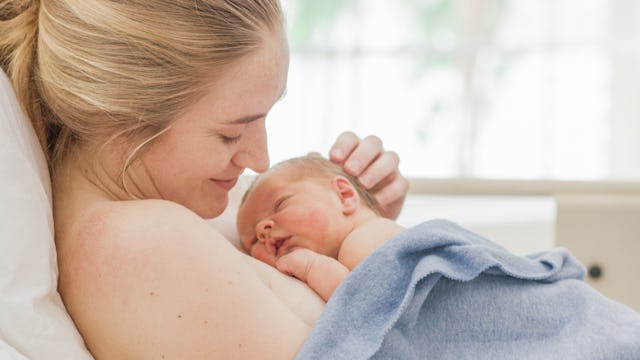Now There's Even More Reasons To Keep Hugging, Snuggling, And Loving On Our Kids

The moment each of my three newborn girls was laid on my chest, I felt the fierce instinct to keep them close kick in. All I wanted to do was snuggle them into me, even when my body protested. There were days when the exhaustion, emotional overload, and body ache of new motherhood had me in tears. Even then, I craved my babies’ touch, to feel the sweet, solid weight of them in my arms.
When my first daughter was born 15 years ago, co-sleeping, on-demand nursing, and constant baby holding seemed strange to the generation before me. Even though I was mostly parenting by instinct in those first few months, I’ll admit that it felt a little strange to me too. Then again, so did all of motherhood.
So I did what felt right to me in the moment. I held my baby when she cried, kept her close at night for feeding, and honestly, it was just plain easier to have her strapped to me than putting her down and picking her up all the time. When I’d reached my physical limit, it was my husband’s turn to do the holding. And he was always eager for his turn.
And despite what we all may have heard, there’s no such thing as giving a child too much love, whether it’s physical or emotional. It doesn’t spoil them or turn them into brats. We’re not indulging them when we hug them, comfort them, or shower them with kisses. When they’re little, they need us to soothe them, help them fall asleep, and learn how it feels to be part of our world. Keeping our little ones close is a natural instinct for most new parents, and it not only strengthens the physical and emotional bond between them, but also positively influences a baby’s brain development.
In fact, new research shows that the more we hug our kids, the smarter it makes them. You know, in case you needed another reason to cuddle and snuggle those sweet littles.
According to a study conducted by the Center for Perinatal Research at the Nationwide Children’s Hospital in Columbus, Ohio, the more we snuggle with our babies, the more their brains grow. Researchers surveyed 125 babies, both pre- and full-term, to determine how they responded to physical touch. Positive physical experiences like breastfeeding and skin-to-skin contact showed stronger brain responses, while negative interactions, like skin pricks and tube insertions, showed reduced brain responses. While preemies experienced an overall reduced response to gentle touch compared to full-term babies, the more they were held, the more their brain response improved.
So how does this research support the idea of potential increased brainpower? When babies are born, their brains are clearly still developing. The more positive experiences they encounter, the more their brain responds and grows. For newborns, touch is the primary way they experience the world. Cuddling, hugging, and rocking our babies encourage their sensory systems to develop. This includes touch, pressure, pain, vibration, and movement. A fully developed sensory system is one of the foundational blocks that determine the success of perceptual, cognitive, and social development that comes as children grow.
My youngest is 6 now, and fortunately, she is still a total snuggler. I love curling up with her in her bed or just hanging out on the kitchen floor with her in my lap while we both cuddle with the dog. With a tween and teen in the house, I know my little one won’t always want to be this close to me, and I savor these special times.
Lucky for all my girls, I’m the mom who never gives up, who always wants to go in for the hug, even when subject to heavy teenage eye rolls. They might act like they don’t want the snuggle, but deep down, I know they do. Doesn’t everyone, grown-up and child alike?
I’ve told them I don’t ever plan on stopping with the hugs. I even dug up a little science that shows my hugging is probably making them smarter, even though they’re not babies anymore. It was once thought the brain stopped developing around age 5 or 6. However, recent research shows that when kids go through puberty, their brains actually experience another growth spurt. It makes sense, then, that I should hug the daylights out of ‘em as much as possible just to make sure they reach their full intellectual potential, right? I thought so.
Without question, parenting is a challenge we often face on the fly. We read the books, collaborate with our mom friends, and search online for advice, support, and answers. Trusting ourselves as the best possible caregivers for our children isn’t always easy, but following our instincts is often the right way to go. Science says you can’t love or hold your baby too much. Affection isn’t just about making sure our kids feel loved and secure. It’s also about encouraging their little brains to reach their full potential.
So hug and hold those babies, and don’t let anyone try to change your mind.
This article was originally published on